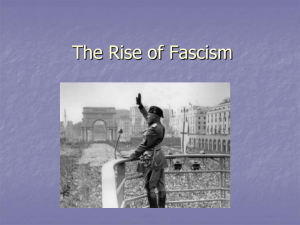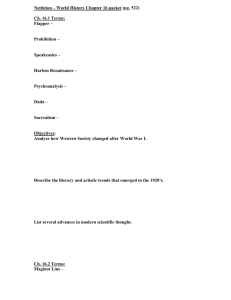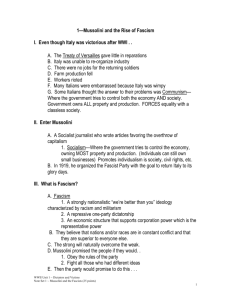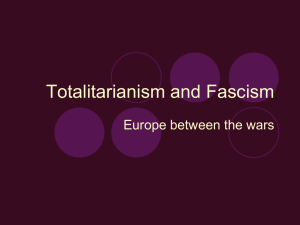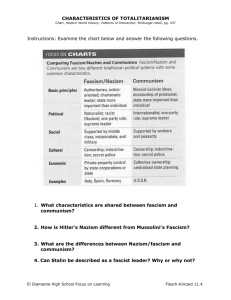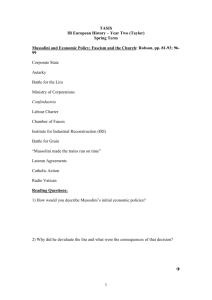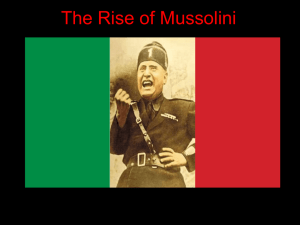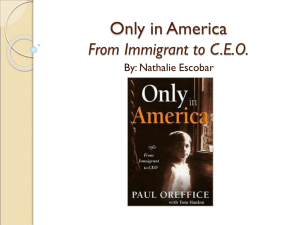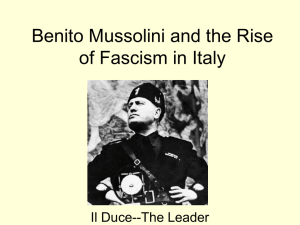Italian Fascism
advertisement
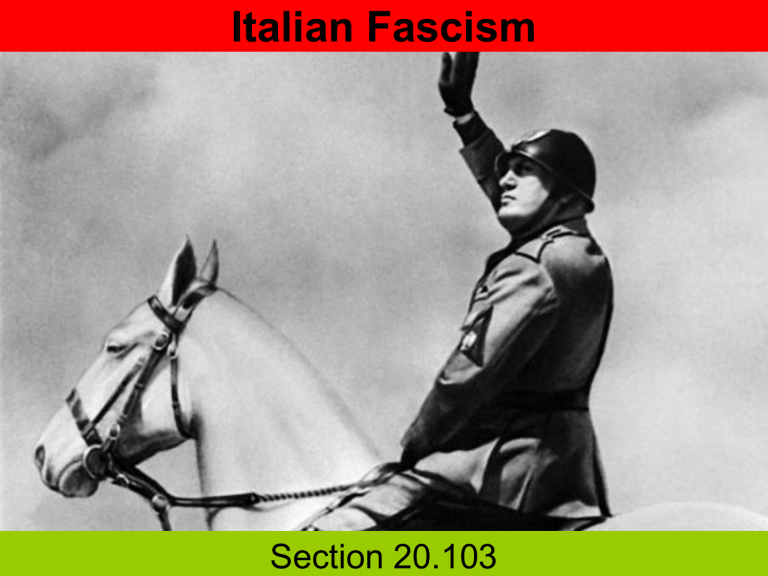
Italian Fascism Section 20.103 Differences between Dictatorship and Totalitarianism • Dictatorship • Older & only a theory of government • Expedient • Designed for emergencies • Believed to be temporary • Totalitarianism • Created after WWI • Not just a government but theory of life and human nature • Permanent form of society and civilization • An everlasting emergency The Birth of Fascimo • Advancement of Democracy still held in 1920 – Russia, Turkey, China’s failure to develop liberal institutions didn’t count as they were “backwards” nations • But democracy was jolted when Italy (major force in European history and parliamentary since 1861) became fascist in 1922 • Mussolini – Born in 1883 – Son of a blacksmith – Followed the career of professional revolutionary – Influenced by Sorel’s Reflections on Violence, Nietzsche • Became intensely nationalist during WWI • Wanted Italy to join the Allies and wanted Austrian territory of Italia irredenta (unredeemed Italy) • Only reached rank of corporal during war Fascio di combattimento • March 1919 organized his first fascio di combattimento – Fighting band of ex-soldiers • Fascio: bunch or bundle (or rods) – Carried by the lectors (ancient Rome) as a symbol of state power and meant to conjure up ancient glories • Italy went to the treaty negotiations believing they would receive ample compensation for the 600,000 lives they lost in WWI • Had been promised territory in secret treaty of London in 1915 • Received some of the Austrian territories they wanted • Received none of the Turkish territories they wanted Social Unrest • After WWI depression and unemployment led to social unrest • Tenant farmers seized land and refused to pay rents • Peasants burned crops, killed livestock • Workers staged sit down strikes • Communist (Left wing socialists) of the Comintern (after the 3rd International) spread discontentment • Blackshirts or Fascists fell into conflict with the communists – Brawling in the streets and other acts of violence persisted • 1919 election the Catholic Popular (Christian Socialist) party had impressive showing • 1921 elections Mussolini’s Fascists won 35 seats out of 500 – Fascists ranks were growing Mussolini: Upholding Order & Property • At first encouraged factory seizures and seemed anti capitalistic • Although there was not a real threat of “Bolshevik” style revolution, the propertied interests felt threatened • Mussolini tossed out idealism and pledged to uphold law and order – IE to protect propertied class • Gave financial support to Mussolini • Nationalists, unemployed and discouraged (from unionism) lower middle classes joined • Blackshirts abused Communists and Socialists in various ways to stifle their movements – Forced feedings of castor oil • Moved against labor unions as well – Squadristi (vigilante fascists squadrons) broke up strikes, committed arson, murder • Reinforced his claim as paladin of law and church – A few years earlier he was republican and anticlerical March on Rome • Blackshirts marched on Rome from various directions (October 1922) • Mussolini waited in Milan • Coalition government (liberal dem) had allowed fascism to exist (as it rid nation of leftist troublemakers) • Tried to enforce martial law but king backed down • Forced the cabinet to resign • Under the Kings authority Mussolini (Premier) and his coalition were granted emergency powers to restore order in Italy for 1 year • Before the year was up Muss forced through Parliament a law – Party that wins the most votes in an election receives 2/3 of the seats in the Parliament • This was his solution to the instability of coalitions • Fascists won 3/5 of the seats anyway (Why?) – His gov. controlled the political machinery – His cronies (Squadristi) greeted voters at the polls Matteotti’s Murder • Well respected Socialist deputy Matteotti exposed hundreds of cases of the heavy handed tactics (fraud, violence) of the Fascists – was murdered • Italian press called for Mussolini’s resignation • At first Muss said he would punish the perpetrators but later took responsibility • refused to resign and began to centralize his power – – – – – Reduced the Italian parliament to a nonentity Put the press under censorship Destroyed the labor unions Deprived labor of the right to strike Abolished all political parties El Duce • Criticized democracy as factional – Out of date government that only accentuated class struggle • Led to selfishness, futility, empty talk • Preached the need of vigorous action under a strong leader • El Duce (The Leader) • Denounced liberalism, free trade, laissez-faire capitalism, Marxism, materialism, socialism, and class consciousness – Said these were evil offspring of capitalism and liberalism • Preached national solidarity and state managed economy • Brought a certain efficiency to Italy that was missing (trains always on time) The Cooperative State • Mussolini began what had been contemplated by Left and Right since lat 1800s – Left wing syndical organization called for labor to control sectors of the economy – Conservative syndical organization called for state control of sectors of the economy • Supported by Catholic Church after the Lateran accord (1929) • Seemed a revival of the guild system – Except Mussolini’s state controlled virtually everything • Similar to a corporate board of directors • Divided all economic life into 22 major sectors – Each had its own corporation • Division leaders (made up of labor, employers, and government) were to direct the activities within their sector – directed labor, Organized the employers, Monitored working conditions – Determined wages, prices, and policies State Control of Economic Life • National council of division leaders were to plan the economic activities of the nation – Focus on self-sufficiency • Said that the state should be organized around the nations economic occupations • IE. State determined all answers to economic questions (What to produce, Who makes it, gets it, at what price, …?) but allowed private enterprise (profit) to exist • Mussolini called it a dictatorship of the state over many classes cooperating Depression • Mussolini blamed the world for the depression • Called for self sufficiency • Started public works projects – Hydroelectric power – “Battle of wheat” proclaimed to increase wheat production • Little reform was made between the social extremes of wealth and poverty • Fascism failed to provide economic security or material well being for those it demanded so much sacrifice of individual freedom • Spirit of recapturing the past glories of Rome was enough distraction for the population that it was less critical of Fascism • Imperialist adventures gave a sense of greatness & distracted the Italians The Appeal of Fascism • A possible alternative to democratic or parliamentary government • Communists, socialists, labor leaders, and liberals hated fascism • Wealthier or established people liked it because it reduced the threat of Bolshevism • Tentative democracies in Eastern Europe that struggled under the concepts of majority vote were attracted to fascism • Mussolini said fascism “was born of the need for action” Mussolini 1933 by Diego Rivera from DR Museum

